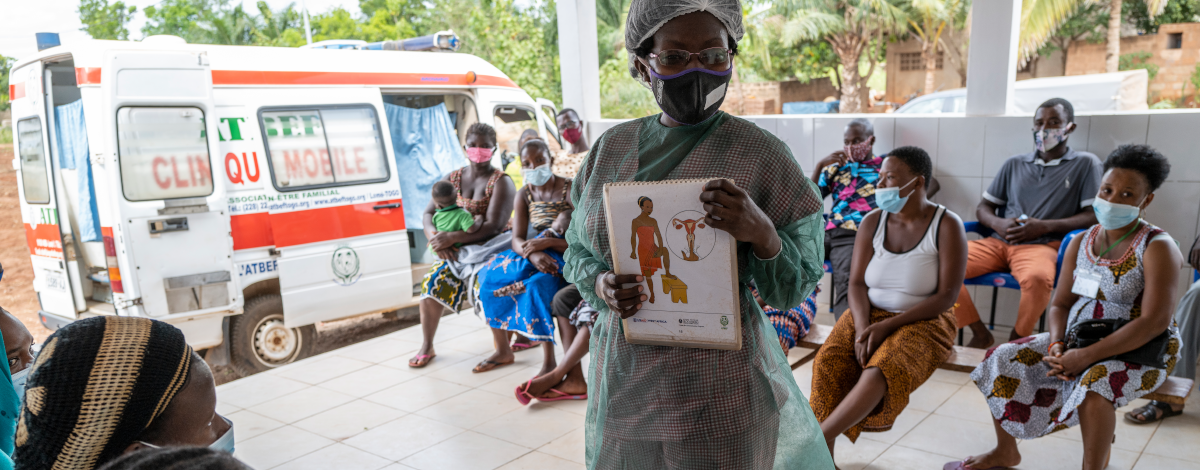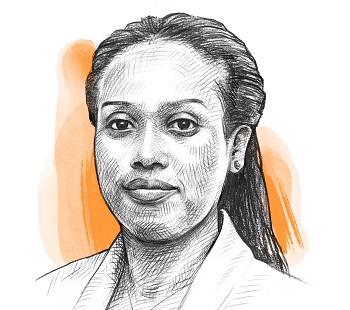FSP-I – DSSR Project

Objective
-
€0.8mBUDGET
-
01/06/2019PROJECT START
-
24 monthsDURATION
The context of sexual and reproductive health in West and Central Africa
In West and Central Africa (WCA), while over 65% of the population is under 24, young people and adolescents face serious difficulties in terms of sexual and reproductive health (SRH). Access to appropriate SRH services is limited and there is a high proportion of unmet needs for family planning.
There are serious consequences: school dropout, sexually transmitted infections – including HIV –, early pregnancies, unsafe abortions and gender-based violence. Girls are the most affected, with a teenage pregnancy rate more than double the world average. In 2016, in this part of the world, 29% of young women aged 20-24 had given birth before they were 18 (UNFPA, State of World Population 2016). In addition, early and unwanted pregnancies, along with school-related gender-based violence, are among the main barriers to girls’ education.
Several factors can be identified to account for this context. WCA has the lowest health and gender equality indicators of the Sustainable Development Goals. Furthermore, although the countries have ratified the international treaties on sexual and reproductive rights and health (SRRH), their application remains relative. It comes up against the persistence of taboos and certain cultural and religious practices. Access to sexual and reproductive rights for young people is thereby limited by discriminatory social norms that further restrict the empowerment of young girls. Only 4.1% of girls aged 15-19 have access to contraception in Senegal, against 10.1% in Togo, despite the fact that maternal deaths are the second most common cause of mortality among adolescent girls in West Africa. There is also a strong correlation between the teenage pregnancy rate and the prevalence of child marriages, which affect 31% of girls under 18 in Senegal and 22% in Togo.
With no information and comprehensive sexuality education, adolescence is a period when young people are particularly vulnerable. By giving them knowledge, attitudes and skills to lead a healthy, equal and inclusive social and sexual life, education in reproductive health fuels a virtuous circle between education and health.
FSP-I – DSSR Senegal and Togo is being implemented in this context. It aims to work to improve the situation of girls by promoting equality between girls and boys and sexual and reproductive health for adolescents in and out of school.
This project follows on from a previous project, FSP-I Support for the Fight against School-Related Gender-Based Violence (SRGBV), which was implemented between 2016 and 2018 in Togo, Senegal and Cameroon.
Objectives of the FSP-I – DSSR Senegal and Togo project
The project aims to take action on two components:
• Component 1: promote access to SRH services through non-formal sectors and strengthen the advocacy capacity for the sexual and reproductive rights and health (SRRH) of young people in Senegal and Togo.
• Component 2: strengthen the capacity to implement education policies that promote equality between girls and boys through comprehensive sexuality education (CSE) and the response to school-related gender-based violence (SRGBV) in Senegal and Togo.
The project is therefore structured between education and health. It is deploying specific advocacy activities vis-à-vis the authorities, developing teacher training and carrying out work at the community level. The effectiveness of the programme is ensured through actions at all levels (institutional, school, religious, community), while taking the national context into account.
Stakeholders in the FSP-I – DSSR project
Project beneficiaries
For component 1, the direct beneficiaries are the non-formal structures that provide young people with services and information on sexual and reproductive rights and health (SRRH), the civil society structures that advocate for SRRH, as well as parents, community and religious leaders and youth clubs.
Component 2 directly targets the formal structures of the Ministries of Education and Health, the relevant regional departments, teachers, academic inspectors, educational advisors, school principals and teacher training institutes.
These direct beneficiaries are allowing the project to reach its final beneficiaries: adolescents in and out of school, particularly the most vulnerable and young girls. The entire community and institutions responsible for education are also benefiting from the project.
Project partners
Financed by the French Ministry for Europe and Foreign Affairs, the FSP-I – DSSR Senegal and Togo project is coordinated by Expertise France and implemented by UNESCO and the International Planned Parenthood Federation (IPPF). UNESCO has worked on component 2, concerning the institutional aspect. Component 1, which is based on the community aspect, has been deployed by the IPPF, with support from two partner NGOs in the field:
• The Togolese Association for Family Well-Being (ATBEF) in Togo
• ENDA Health in Senegal
Lessons learnt from the project
At the project completion, Expertise France managed the evaluation of the actions taken, which aimed to report on the programme’s relevance and performance.
Anne Boutin, evaluator and director of the consultancy firm Gaia Développement, was mandated to conduct this evaluation. Through this report, she takes a look at the situation in Senegal and Togo, explains how the evaluation was conducted and highlights the lessons learnt from the project.
For further reading: “Adolescents and young girls need specific support”


